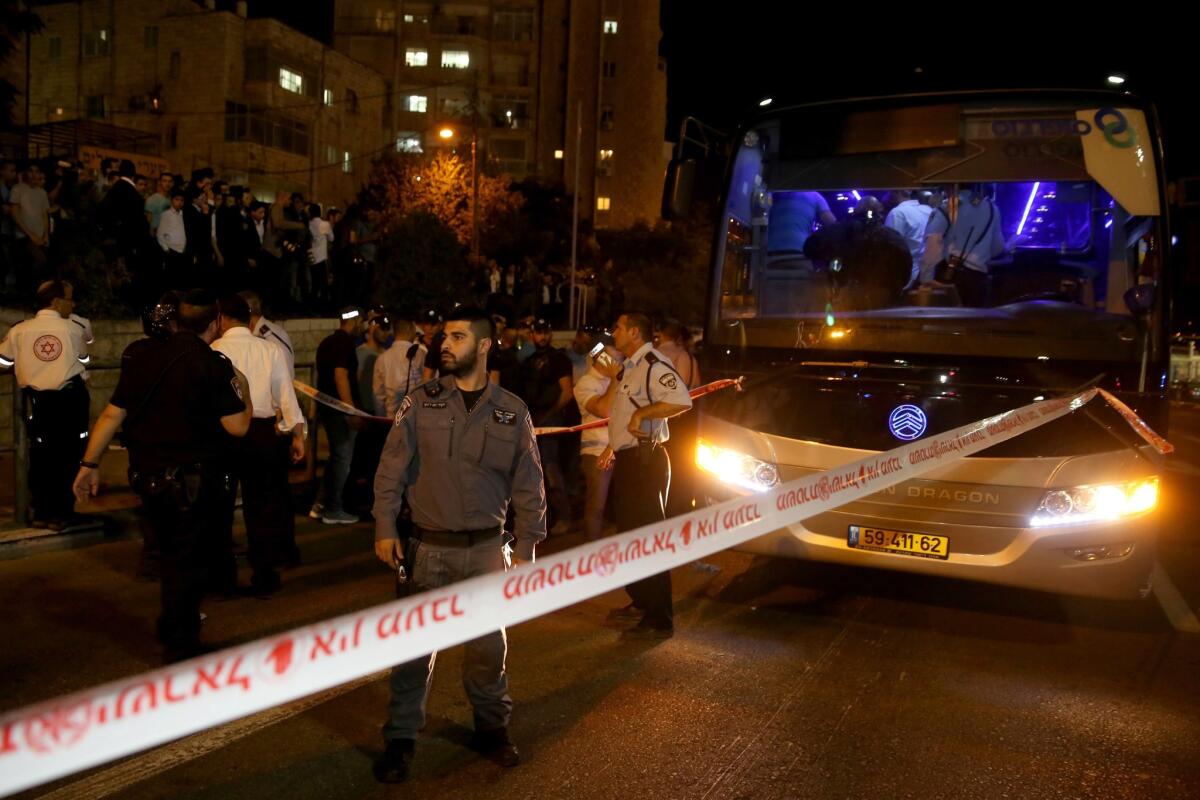Knife assaults on Israelis continue wave of violence in Jerusalem

Israeli security forces and medics gather at the scene where an Arab man on a Jerusalem bus stabbed an off-duty Israeli soldier and tried to grab his weapon, lightly wounding him, before being shot dead by security forces on Oct. 12, 2015.
- Share via
Reporting from Jerusalem — A series of stabbing attacks on Monday continued the violence that has rocked Israel this month, leaving three suspected Palestinian assailants dead and at least five Israelis injured, including a 13-year-old boy who was in critical condition, security and medical officials said.
Small-scale but deadly confrontations over the last two weeks have caused four Israeli fatalities, according to officials. During the same period, at least 27 Palestinians have been killed in the West Bank, Gaza Strip and Jerusalem, according to Palestinian reports.
NEWSLETTER: Get the day’s top headlines from Times Editor Davan Maharaj >>
Continuing the pattern of recent days, several of Monday’s attacks were carried out by Palestinian teenagers. In the Jewish neighborhood of Pisgat Zeev in traditionally Arab East Jerusalem, witnesses said two youngsters first stabbed a 24-year-old man, seriously wounding him, and then attacked the 13-year-old, who had ridden his bike to a candy store.
The suspects, from the nearby neighborhood of Beit Hanina, were identified as two brothers ages 13 and 15; the elder was killed and the younger wounded by police responding to the stabbing attacks. The surviving brother was being treated at the same hospital as the victims.
Jerusalem Mayor Nir Barkat, who paid a visit to hospitalized Israelis, called on Prime Minister Benjamin Netanyahu to take stronger action against those encouraging attacks with inflammatory rhetoric. In a statement, the mayor denounced the recent wave of attacks as a “shocking form of evil.”
Earlier Monday, an 18-year-old Palestinian man was killed after stabbing and lightly wounding a policeman in Jerusalem’s Old City. Another police officer was attacked near the national police headquarters by a knife-wielding 16-year-old Palestinian girl, who was shot and wounded.
Violence continued into the evening, with a soldier hurt when an attacker tried to grab his gun on a bus near the main entrance to Jerusalem, prompting a brief road closure that snarled traffic. The perpetrator, who was not immediately identified, was shot dead by police who arrived at the scene after passengers fought off the assailant.
Amid the drumbeat of attacks, Israel’s parliament, or Knesset, convened in Jerusalem for its winter session. Addressing lawmakers, President Reuven Rivlin warned that the conflict had taken on a religious overtones, centering on Palestinian claims that Israel is seeking to change the decades-old status quo at a key Old City site that is holy to Jews and Muslims.
Rivlin, echoing longstanding Israeli government assertions, denied that Israel intends to change arrangements governing access to the plateau known to Muslims as Haram al Sharif and to Jews as the Temple Mount. He called such claims a “dangerous libel that … is costing innocent blood.”
Netanyahu, for his part, outlined new security measures, vowing to quell what he called “the terror of knives” – the wave of primarily stabbing attacks that have roiled the country.
At the Knesset session, the prime minister called on Palestinian Authority President Mahmoud Abbas to denounce incitement and condemn terrorist attacks. The Palestinians have angrily accused Israel of escalating the violence, and most of the Knesset’s Arab lawmakers walked out in protest as the prime minister took to the podium.
Opposition leader Isaac Herzog accused Netanyahu of ignoring the warning signs that preceded the outbreak of violence in Jerusalem.
“The writing was on the wall, but you are like the three monkeys: You don’t hear, don’t see, don’t speak,” Herzog said.
Sobelman is a special correspondent.
ALSO
A ‘kaleidoscopic’ mix of rebel alliances on Syria’s battlefield
Pawns for Tehran? A look at the Americans being held prisoner in Iran
Jason Rezaian’s family still not told what verdict is in Iran spying case
More to Read
Sign up for Essential California
The most important California stories and recommendations in your inbox every morning.
You may occasionally receive promotional content from the Los Angeles Times.












